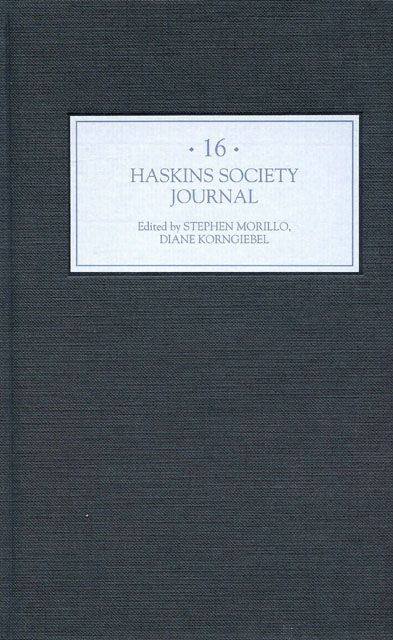Book contents
- Frontmatter
- Contents
- Editor’s Note
- Abbreviations
- 1 Hallucinations of Power: Climates of Fright in the Early Twelfth Century
- 2 Sites and Occasions of Peacemaking in England and Normandy, c. 900–c. 1150
- 3 Trans-border Transactions: Patterns of Patronage in Anglo-Norman Wales
- 4 Lay Piety, Confessional Directives and the Compiler’s Method in Late Anglo-Saxon England
- 5 Furor Teutonicus. A Note on Ethnic Stereotypes in Suger’s Deeds of Louis the Fat
- 6 Law and Theology in Gilbert of Foliot’s (c. 1105/10–1187/88) Correspondence
- 7 A Lost Law of Henry II: The Assize of Oxford and Monetary Reform
- 8 The Renaissance of the Twelfth Century Before Haskins
- 9 ‘Hobbes’, ‘Dogs’ and Politics in the Ireland of Lionel of Antwerp, c. 1361–6
5 - Furor Teutonicus. A Note on Ethnic Stereotypes in Suger’s Deeds of Louis the Fat
Published online by Cambridge University Press: 23 March 2023
- Frontmatter
- Contents
- Editor’s Note
- Abbreviations
- 1 Hallucinations of Power: Climates of Fright in the Early Twelfth Century
- 2 Sites and Occasions of Peacemaking in England and Normandy, c. 900–c. 1150
- 3 Trans-border Transactions: Patterns of Patronage in Anglo-Norman Wales
- 4 Lay Piety, Confessional Directives and the Compiler’s Method in Late Anglo-Saxon England
- 5 Furor Teutonicus. A Note on Ethnic Stereotypes in Suger’s Deeds of Louis the Fat
- 6 Law and Theology in Gilbert of Foliot’s (c. 1105/10–1187/88) Correspondence
- 7 A Lost Law of Henry II: The Assize of Oxford and Monetary Reform
- 8 The Renaissance of the Twelfth Century Before Haskins
- 9 ‘Hobbes’, ‘Dogs’ and Politics in the Ireland of Lionel of Antwerp, c. 1361–6
Summary
In 1124, ‘on the advice of the English king, Henry’, Emperor Henry V ‘was plotting a surprise attack against the city of Reims’. Suger's account of how Louis VI gathered a great army to rebut the enemy is viewed by many as a correct perception of a climax in Louis's reign. Some see in this episode ‘the real birth of the regnum Franciae in its wider sense’. Others go as far as to claim that Louis's stand against Henry V in 1124 is the ‘first expression of national patriotism in France’. According to Suger, Louis's army consisted of an impressive list of royal vassals and allies: the men of Reims (mentioned first, because the emperor intended to attack Reims), Châlons, Laon, Soissons, Orléans, Étampes, Paris, Ponthieu, Amiens, and Beauvais; Charles the Good, count of Flanders, and William, duke of Aquitaine; Conan, count of Brittany, and Fulk, count of Anjou; the palatine count, Theobald, and Hugh, count of Troyes; the duke of Burgundy and the counts of Nevers and Vermandois. All were now united under the banner of St Denis, the liege lord of King Louis. It has also been noted that a French sense of unity, as reflected in this famous episode, was created more obviously against Germans than against Catalans or Englishmen.
To be sure, internal group solidarity may be a product of external armed conflict and war ‘requires a centralistic identification of the group form’. Major conflicts mobilize the members of the community and bring together persons who have otherwise nothing to do with each other. Ethnicism is essentially defensive, a response to outside threats and divisions within. Ethnicity, however, is situational, depending upon particular social and political circumstances. Did the episode of 1124 create such special conditions for the emergence of French ethnicity? Did Louis VI's vassals and allies view themselves as members of the same, newly defined community? Why did Suger emphasize the episode of 1124? What was the motivation for his treatment of the ‘enemy’? Where did originate his attitude toward Germans, the threat of 1124, which supposedly triggered the first expression of French patriotism? In this paper, I will attempt to answer some of these questions by examining Suger's Deeds of Louis the Fat. Suger is the only ‘pro-French’ source for the episode of 1124, and he wrote twenty years after the event.
- Type
- Chapter
- Information
- The Haskins Society Journal2005. Studies in Medieval History, pp. 62 - 76Publisher: Boydell & BrewerPrint publication year: 2006



